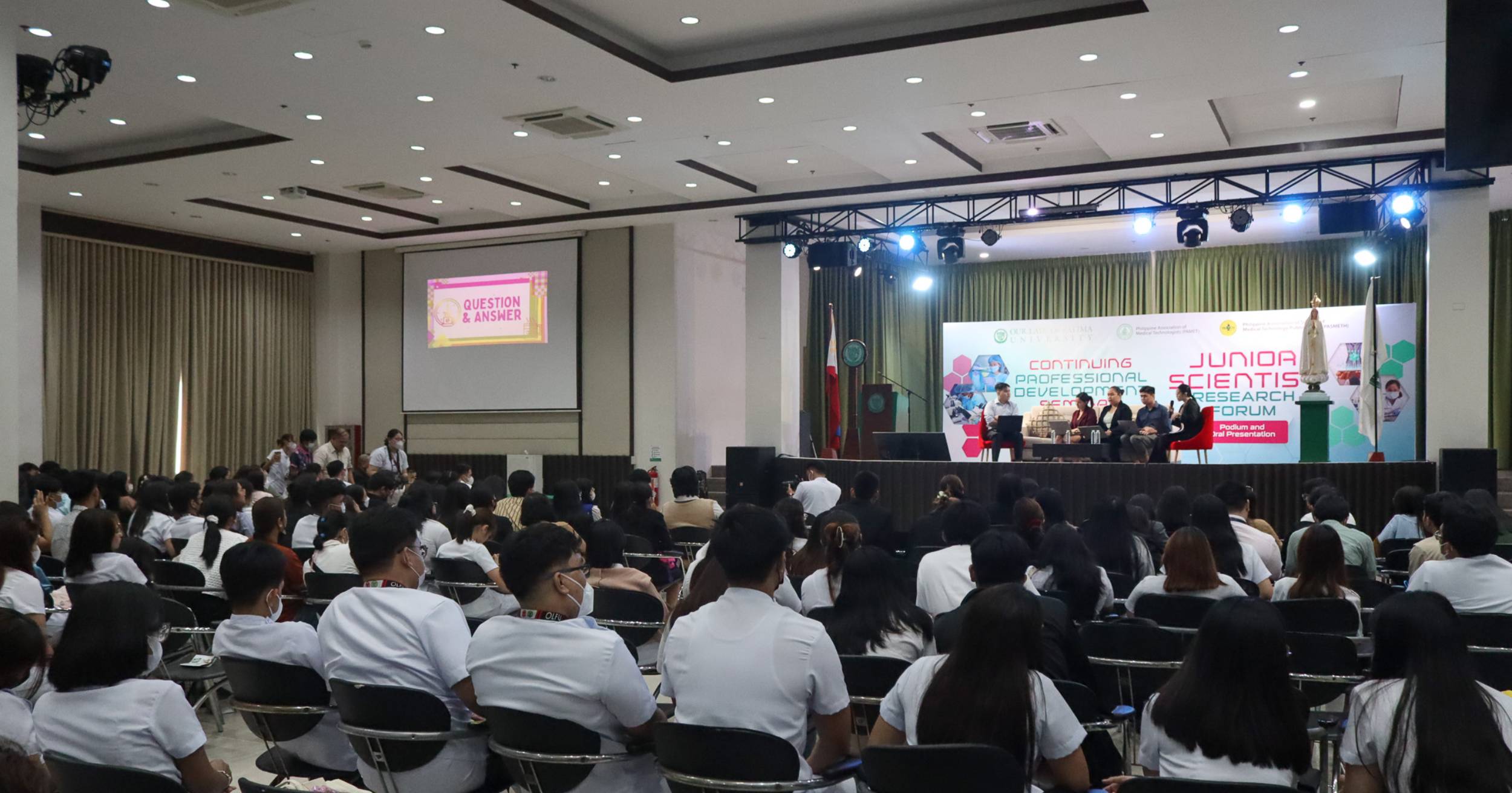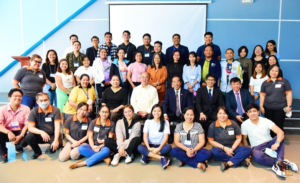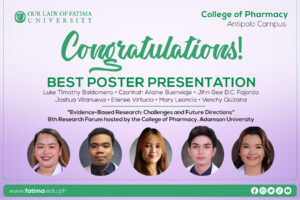As part of the celebration of Medical Technology Week this year, the Philippine Association of Medical Technologists (PAMET) accomplished its back-to-back continuing professional development (CPD) seminar and Junior Scientist Forum at Our Lady of Fatima University (OLFU) on 18 September 2023.
The Assembly Hall of the RISE Tower housed the program that opened with a solemn doxology followed by the singing of the Philippine National Anthem and the PAMET Hymn.
Before the CPD seminar proper, PAMET President Luella Vertucio rendered an opening speech expressing her gratitude to her officers as well as the passionate partners in the Philippine Association of Schools of Medical Technology (PASMETH) led by their incumbent President who is also OLFU’s Medical Laboratory Science Dean Jose Jurel Nuevo.
The energetic chief anatomized the central theme of the confab, stressing the importance of ethics and the foundation of cultural trust in research and professional practice in the medical technology industry.
“These things reflect our commitment to excellence, the highest standards of integrity [in] pursuing knowledge and caring for those we serve,” said Vertucio.
While acknowledging the monumental role that medical technologists are taking on to enrich healthcare delivery, the President objectively echoed the “even greater responsibility to uphold ethical standards ensuring that trust is never compromised.”
Articulating on the same discipline, the president asserted that ethics is a moral compass that constantly checks our every move in the field. “It is about doing what is right even [if] it is challenging, striving for the greater good not just for us but for all those who rely on us,” the leader wisely added.
On the other hand, Vertucio casually discussed the “unprecedented phase” of medical technology concerning privacy in the data-driven era, the management of artificial intelligence, and the equitable distribution of medical breakthroughs.
In the end, the PAMET leader hoped that the exchange of expertise and experience would later challenge the attendees to critically gauge their salient field.
Dilemmas and responsibilities, a talk on research ethics
The high-yielding discussion was spearheaded by Prof. Florence Natividad, an expert educator of the Department of Medical Technology at the University of Santo Tomas (UST) who is also an active proponent in studies covering social health and sciences, health education, epidemiology, and medical sciences.
Filling in sub-areas of her broad topic, the adept educator and medical technologist effectively delivered her part with an outline of four main points including the milestones in ethical development and code of research ethics, elements of research ethics, three categories of review, and the challenging ethical issues.
Citing prior research, Natividad presented the rationale of ethical research in a nutshell where there was an emphasis on the safeguards of the research participants, their consent, and awareness of the processes and purpose of the research.
The Thomasian professor also traced back the encompassing breakthroughs in the code of research ethics motivated by the Nazi Experiments (1939-1946) to the infamous Tuskegee Syphilis Study (1932-1972).
Covering the international standards, the comprehensive discussion of Natividad also reviewed the Council for the International Organization of Medical Sciences (CIOMS) as well as the United Nations Educational, Scientific, and Cultural Organization (UNESCO) Guidelines.
Of course, Philippine-based research monitoring camps have been also covered by the extensive podium talk including the existence of the Philippine National Health Research System (PNHRS).
To dive into the integral elements of research ethics, Natividad finally unveiled the gist in the National Ethical Guidelines of 2022 that puts deliberate emphasis on social value, vulnerability of participants, justice, and transparency, among others.
Professional ethics in professional life
The Quality Assurance Manager at the Department of Health (DOH) Prof. Razel Kawano sustained the broad discussion with a perceptive sharing of the scope and field application of professional ethics.
Among salient points in Kawano’s discussion are interrelated disciplines that collectively define the medical technology professional ethics, to wit: patients’ safety and care, trust and confidence, human dignity and compassion, respect for autonomy, innovation and advancement, data integrity, interdisciplinary collaboration, legal regulatory compliance, and professionalism and reputation.
Per the state expert, professional ethics crucially shapes the reputation and trust that eventually results in positive patient experience, effective collaboration, public confidence, and respected professional standing.
The researcher finally corroborated that the “ethics in medical technology provides a moral compass that guides professionals in making decisions that prioritize the welfare of patients,” contributing to the integrity of the healthcare system in general.
On a more pressing note, Kawano also reminded the attendees of the unethical practices in medical technology and its legal implications involving unnecessary tests, plagiarism in research and documentation, conflict of interest, and fraudulent research activities, among other malpractices.
In a forum setup, the feisty expert did not miss and was rather serious in discussing sexual harassment in the field, also condemning its often-downplayed forms such as making inappropriate comments and unwanted advances, displaying explicit material, enduring hostile work environment, and retaliation for rejection.
Revolutionizing medical technology with young minds in the work
For the afternoon session, the Junior Scientist Forum was a show of force as 41 research abstracts by student researchers competed for categories including experimental and non-experimental podium presentations and in the latter part, the research poster.
The experimental category comprised five studies where delegates hailing from different academic institutions in the country competed with their unique and progressive investigations designed to promote the forward motion of the local medical technology industry.
In the end, Ynesa Bethia Arbado from Our Lady of Fatima University Antipolo bagged the third-place award with her commended study “Utilizing Lateral Flow Immunoassay Principle in Blood Typing: A POCT Blood Typing Kit Study.” Also earning the nod of the panel was Isabela Cassandra Marquez of Lyceum of the Philippines University (LPU) Batangas who nabbed the second-place award with her sustainable campaign “Phaseolus vulgaris L. (Baguio Bean) extract as an alternative nutrient source for the culture medium of selected fungal strains.” The study “Molecular Biomarkers Detected Using Fluorescence in Situ Hybridization in a Filipino with Retinoblastoma” by proponent Patrick Reyes Relacion of the University of Santo Tomas (UST) in collaboration with the University of the Philippines (UP) Manila, emerged as the champion.
For the non-experimental category, Christine Jamiele Glaze Jesalva of De La Salle Medical and Health Sciences Institute (DLSMHSI) was declared third-place with the research “Knowledge and Perceptions of Selected Undergraduate Health Allied Students on Human Immunodeficiency Virus (HIV), Pre-Exposure Prophylaxis (PreP), and Post Exposure Prophylaxis (PEP), whileAllysa Gabrielle Rodriguez of Manila Central University (MCU) was named second-place following her regional assessment in the study “Knowledge, Attitude, and Practices on Pap Smear as a Diagnostic Assessment of Cervical Cancer Among Filipino Women in Cebu, Philippines.” Representing UST, Julius Miguel Tizon was hailed as the champion of his exploration of “The Iceberg of Success: A Phenomenological Study of the Lived Experiences of Filipino Medical Technologist Licensure Examination Topnotchers.”
As Dean Nuevo, also the PASMETH President and PAMET Research Chairman, articulated in his speech in the afternoon, the forum did not only celebrate the “remarkable stride that has been made in the field of medical technology but also the unwavering commitment” that the young and aspiring scientists exhibit as the “driven force” that propels the continuous progress of the industry.
“It is a momentous occasion where young minds converge to present their groundbreaking research, exchange ideas, and collaborate with our peers, mentors, and distinguished experts in the field,” said the OLFU dean to emphasize the boundless potential of future leaders in medical technology and public health in the Philippines.
Read: OLFU Valenzuela’s METEOR conducts early MedTech Week celebration
To improve man as man, OLFU has since opened its doors to become a place of assembly where young minds are honed and revered with value formation and excellence.
Needless to say, the second day of PAMET’s Medical Technology Week concluded as an impressive success. – Raymond Lumagsao



